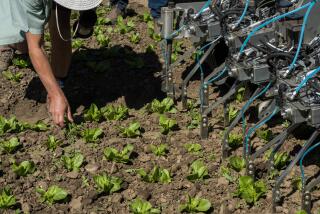Farmers Still Need Convincing Web Is Fertile Ground
- Share via
TULARE, Calif. — Hope and skepticism mingled on the faces of the dusty, boot-clad farmers huddled in a trailer last month at the Tulare Farm Show, watching a presentation by TheAgZone.com on business-to-business e-commerce.
Years of bumper crops and rock-bottom prices have made many growers desperate for ways to reach new customers. But as intrigued as they are by e-commerce’s promise, none in this group was betting the farm on it.
“Our business is built on relationships,” cried one farmer in the audience. “You can’t replace that.”
Still, dozens of Web sites, offering everything from produce trading and feed sales to electronic stockyards, are giving it their best shot. Old-line agriculture stands to gain the most from the shift of business to the Web, analysts say, because of its fragmented nature and the shrinking number of buyers.
By 2004, more than $1 billion, or 10%, of all agricultural business-to-business sales could be conducted over the Net, from feed and tractor purchases to crop sales, according to an estimate by Goldman Sachs.
By finding new customers here and abroad and gaining access to up-to-the-minute pricing and supply information, smaller growers could command higher prices for their products, says Diane Friend, a cattle rancher and founder of Horsepower.com, a site that helps farmers trade 420 different commodities.
Moreover, she says, growers could find markets for the kinds of things supermarkets such as Ralphs or Vons won’t buy--blemished or small vegetables for livestock feed and specialty crops such as Chinese vegetables.
“You’ve got all this product that funnels through this little stream [of middlemen and retailers] and out to millions of consumers,” Friend says. “We’d just like to see the center of that hourglass open back up a little bit and return some of the marketing costs to producers.”
The Internet could also help speed the globalization of agriculture by wiping out local monopolies that hinder distribution in other countries, says Tom Hazlett, a professor of agricultural and resource economics at UC Davis. But, he says, it could also provide more competition from producers abroad.
The global potential of agricultural e-commerce has prompted investment bankers and venture capitalists to funnel tens of millions of dollars into farm-related sites such as TheAgZone.com, Farms.com, Tradingproduce.com, Buyproduce.com, Agex.com, Agribuys.com and DirectAg.com.
But as good as these sites sound, some growers say they don’t change the basic requirement of the business--volume.
“Is someone from New York going to buy five to 10 cartons of lemons from a farmer in Ventura?” says Parry Klassen, who grows peaches on 10 acres in Selma. “They’re only going to pay to ship 10,000 or 20,000 cartons of something.”
Small growers, Klassen says, still need to deal with a local broker who can pool their produce in large enough amounts to make it attractive for ever-expanding supermarket and restaurant chains.
To persuade skeptics such as these and penetrate the tightknit California farming industry, Web executives have begun hitting the farm circuit, attending equipment shows like these, American Farm Bureau Federation meetings and just about any other place growers congregate.
They’ve fanned out a sales force--many recruited from the state’s largest produce companies--to talk to some of the larger, more influential growers.
“They’re all calling trying to get me to sign up,” complains Wayne Brandt, who packs a million pounds of peaches, plums and nectarines in Reedley. “I can’t even keep track of them.”
At the recent Tulare show, TheAgZone.com was handing out baseball caps and showing growers and equipment sellers how to post electronic storefronts. Farms.com and Farmbid.com were giving demonstrations of their online bidding systems, while simultaneously knocking their competitors.
These Web site operators know that farmers aren’t as slow to embrace technology as most people believe. Just under half of California farmers are using the Net, compared with 23% three years ago. However, most are using it for e-mail, to buy equipment or to scan for content such as weather reports or crop prices, says one Farm Bureau official, not to buy and sell commodities.
“Farmers in rural areas rely on the Internet to access things they wouldn’t be able to get otherwise,” says Rick Bush, who handles online services for the Park Ridge, Ill.-based Farm Bureau. “And it saves them a long trip into town.”
Although Brandt, 63, has ordered a used forklift from EBay and uses the Internet to communicate with buyers, he is cautious about shifting marketing to the Web. “We’re going to have to check with our buyers,” Brandt says. ‘We’ll take our cue from them.”
Indeed, although the Internet is supposed to empower farmers by giving them access to new markets, most fear alienating their existing customers.
Months into their operations, few of these sites have been doing many deals. And almost none have persuaded farmers to shell out money for subscription fees.
Still, just about everyone seems to be experimenting with Web trading.
“It seems a little cumbersome,” says Roger Schroeder, vice president of the Colton-based Stater Bros. supermarket chain’s produce division. “But my gut feeling is it is the right thing to do. We’re going to start using it for certain commodities.”
Horsepower.com, which has been up and running for more than a month, has 300 unpaid members and is averaging 30 to 50 transactions a day.
Friend and her husband, Ralph, created the prototype for Horsepower.com after they discovered that a broker they had paid to sell a load of hay had sold it to a neighbor two miles down the road, reaping a $2,500 profit in about an hour.
“No one can know every other buyer out there,” Friend says. “But you can put [your products] on the Internet and get a hit in five minutes.”
Many brokers aren’t threatened by e-commerce’s promise. They say the Internet should just help them track down produce more cheaply and efficiently. But others see the Internet as a rival, enabling growers to bypass them and reach their existing retail customers.
“The wholesaler is getting squeezed out little by little as all the bigger [grocery] chains go direct,” says Stanley Alvarez, buying manager for Coast Citrus Distributors in San Diego.
“The Internet is going to make it even tougher.”
Ultimately, says the Farm Bureau’s Bush, as real-time quotes become as common as stock quotes and more buyers shift to the Web, the reliance on traditional marketing channels will decline.
“Relationships are great,” Bush says. “But when it’s a matter of price, most people are pretty pragmatic about that.”
More to Read
Inside the business of entertainment
The Wide Shot brings you news, analysis and insights on everything from streaming wars to production — and what it all means for the future.
You may occasionally receive promotional content from the Los Angeles Times.










